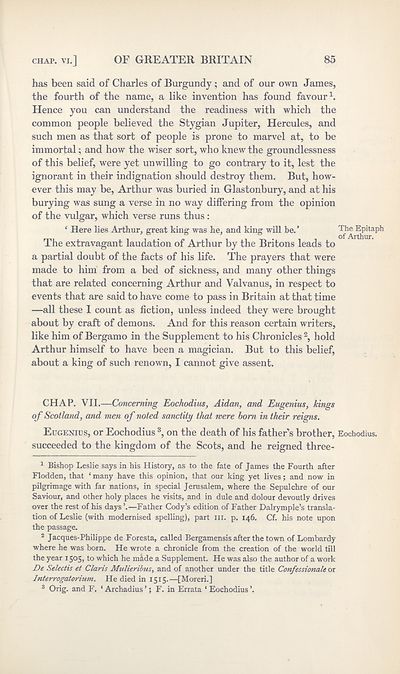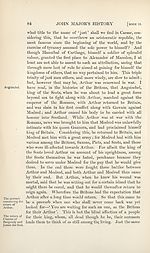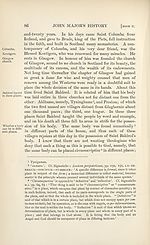Series 1 > History of Greater Britain, as well England as Scotland
(230) Page 85
Download files
Complete book:
Individual page:
Thumbnail gallery: Grid view | List view

OF GREATER BRITAIN
85
CHAP. VI.]
has been said of Charles of Burgundy; and of our own James,
the fourth of the name, a like invention has found favour1.
Hence you can understand the readiness with which the
common people believed the Stygian Jupiter, Hercules, and
such men as that sort of people is prone to marvel at, to be
immortal; and how the wiser sort, who knew the groundlessness
of this belief, were yet unwilling to go contrary to it, lest the
ignorant in their indignation should destroy them. But, how¬
ever this may be, Arthur was buried in Glastonbury, and at his
burying was sung a verse in no way differing from the opinion
of the vulgar, which verse runs thus:
‘ Here lies Arthur, great king was he, and king will be. ’ The Epitaph
The extravagant laudation of Arthur by the Britons leads to
a partial doubt of the facts of his life. The prayers that were
made to him from a bed of sickness, and many other things
that are related concerning Arthur and Valvanus, in respect to
events that are said to have come to pass in Britain at that time
—all these I count as fiction, unless indeed they were brought
about by craft of demons. And for this reason certain writers,
like him of Bergamo in the Supplement to his Chronicles2, hold
Arthur himself to have been a magician. But to this belief,
about a king of such renown, I cannot give assent.
CHAP. VII.—Concerning Eockodius, Aidan, and Eugenius, kings
of Scotland, and men of noted sanctity that mere bom in their reigns.
Eugenics, or Eochodius 3, on the death of his father’s brother, Eochodius.
succeeded to the kingdom of the Scots, and he reigned three-
1 Bishop Leslie says in his History, as to the fate of James the Fourth after
Flodden, that ‘ many have this opinion, that our king yet lives; and now in
pilgrimage with far nations, in special Jerusalem, where the Sepulchre of our
Saviour, and other holy places he visits, and in dule and dolour devoutly drives
over the rest of his days —Father Cody’s edition of Father Dalrymple’s transla¬
tion of Leslie (with modernised spelling), part ill. p. 146. Cf. his note upon
the passage.
2 Jacques-Philippe de Foresta, called Bergamensis after the town of Lombardy
where he was born. He wrote a chronicle from the creation of the world till
the year 1505, to which he mide a Supplement. He was also the author of a work
De Selectis et Claris Mulieribus, and of another under the title Confessionals or
Interrogatorium. He died in 1515.—[Moreri.]
3 Orig. and F. ‘ Archadius ’; F. in Errata ‘ Eochodius ’.
85
CHAP. VI.]
has been said of Charles of Burgundy; and of our own James,
the fourth of the name, a like invention has found favour1.
Hence you can understand the readiness with which the
common people believed the Stygian Jupiter, Hercules, and
such men as that sort of people is prone to marvel at, to be
immortal; and how the wiser sort, who knew the groundlessness
of this belief, were yet unwilling to go contrary to it, lest the
ignorant in their indignation should destroy them. But, how¬
ever this may be, Arthur was buried in Glastonbury, and at his
burying was sung a verse in no way differing from the opinion
of the vulgar, which verse runs thus:
‘ Here lies Arthur, great king was he, and king will be. ’ The Epitaph
The extravagant laudation of Arthur by the Britons leads to
a partial doubt of the facts of his life. The prayers that were
made to him from a bed of sickness, and many other things
that are related concerning Arthur and Valvanus, in respect to
events that are said to have come to pass in Britain at that time
—all these I count as fiction, unless indeed they were brought
about by craft of demons. And for this reason certain writers,
like him of Bergamo in the Supplement to his Chronicles2, hold
Arthur himself to have been a magician. But to this belief,
about a king of such renown, I cannot give assent.
CHAP. VII.—Concerning Eockodius, Aidan, and Eugenius, kings
of Scotland, and men of noted sanctity that mere bom in their reigns.
Eugenics, or Eochodius 3, on the death of his father’s brother, Eochodius.
succeeded to the kingdom of the Scots, and he reigned three-
1 Bishop Leslie says in his History, as to the fate of James the Fourth after
Flodden, that ‘ many have this opinion, that our king yet lives; and now in
pilgrimage with far nations, in special Jerusalem, where the Sepulchre of our
Saviour, and other holy places he visits, and in dule and dolour devoutly drives
over the rest of his days —Father Cody’s edition of Father Dalrymple’s transla¬
tion of Leslie (with modernised spelling), part ill. p. 146. Cf. his note upon
the passage.
2 Jacques-Philippe de Foresta, called Bergamensis after the town of Lombardy
where he was born. He wrote a chronicle from the creation of the world till
the year 1505, to which he mide a Supplement. He was also the author of a work
De Selectis et Claris Mulieribus, and of another under the title Confessionals or
Interrogatorium. He died in 1515.—[Moreri.]
3 Orig. and F. ‘ Archadius ’; F. in Errata ‘ Eochodius ’.
Set display mode to:
![]() Universal Viewer |
Universal Viewer | ![]() Mirador |
Large image | Transcription
Mirador |
Large image | Transcription
Images and transcriptions on this page, including medium image downloads, may be used under the Creative Commons Attribution 4.0 International Licence unless otherwise stated. ![]()
| Scottish History Society volumes > Series 1 > History of Greater Britain, as well England as Scotland > (230) Page 85 |
|---|
| Permanent URL | https://digital.nls.uk/127734525 |
|---|
| Attribution and copyright: |
|
|---|
| Description | Over 180 volumes, published by the Scottish History Society, containing original sources on Scotland's history and people. With a wide range of subjects, the books collectively cover all periods from the 12th to 20th centuries, and reflect changing trends in Scottish history. Sources are accompanied by scholarly interpretation, references and bibliographies. Volumes are usually published annually, and more digitised volumes will be added as they become available. |
|---|


